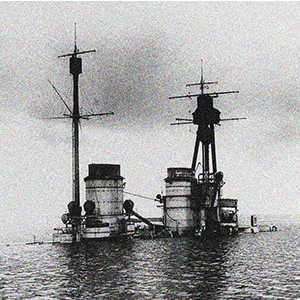 The end of World War I marked a significant shift in global power dynamics, and the Treaty of Versailles aimed to reshape Europe and prevent future conflicts. One of the most dramatic events during this transitional period was the scuttling of the German Imperial Fleet at Scapa Flow on June 21, 1919. This deliberate sinking of nearly 50 ships was a bold and unprecedented move, demonstrating the lengths to which nations would go to maintain their honor and sovereignty in the face of defeat.
The end of World War I marked a significant shift in global power dynamics, and the Treaty of Versailles aimed to reshape Europe and prevent future conflicts. One of the most dramatic events during this transitional period was the scuttling of the German Imperial Fleet at Scapa Flow on June 21, 1919. This deliberate sinking of nearly 50 ships was a bold and unprecedented move, demonstrating the lengths to which nations would go to maintain their honor and sovereignty in the face of defeat.
In the early 20th century, the naval arms race between Germany and Great Britain was a key factor leading up to World War I. The German Imperial Fleet, also known as the High Seas Fleet, was built to challenge British naval supremacy. During the war, the fleet played a crucial role in several battles, including the famous Battle of Jutland. However, with the signing of the Armistice in November 1918, the once-mighty fleet was rendered powerless and ordered to be interned at the British naval base of Scapa Flow in the Orkney Islands.
Scapa Flow, a natural harbor in the Orkneys, became the final resting place for the German Imperial Fleet. The interned ships were manned by skeleton crews, and life aboard these vessels was monotonous and uncertain. Rear Admiral Ludwig von Reuter, in command of the fleet, was acutely aware of the delicate political situation. The Treaty of Versailles was still being negotiated, and there were fears that the fleet would be seized and distributed among the Allied powers.
The German naval officers, including von Reuter, were determined to prevent their fleet from falling into enemy hands. The decision to scuttle the ships was made in secret, with von Reuter communicating the plan to his officers through coded signals. The goal was to sink the ships if it became clear that the Allies intended to take control of them. This decision was driven by a desire to maintain honor and deny the Allies a significant victory.
On the morning of June 21, 1919, Rear Admiral von Reuter believed that the British were preparing to seize the fleet, as the deadline for the signing of the Treaty of Versailles was imminent. At 10:00 AM, he sent out the signal to scuttle the ships. German crews opened sea valves, and within a few hours, 52 of the 74 interned ships were sinking.
The British forces, taken by surprise, attempted to intervene. However, they could not prevent the majority of the fleet from going under. The sight of massive battleships and cruisers sinking in Scapa Flow was both dramatic and tragic. Personal accounts from both German and British sailors describe the chaos and tension of that day, with many British sailors feeling a mixture of frustration and admiration for their former enemies’ resolve.
The immediate reaction from the Allied powers was one of outrage. The scuttling was seen as a breach of the armistice terms, and there were calls for harsh reprisals against Germany. However, the legal and diplomatic consequences were complex. The Treaty of Versailles was signed just days later, and the focus shifted to rebuilding Europe.
Salvage operations began almost immediately, with British companies recovering many of the sunken ships for scrap metal over the following years. The scuttling had a lasting impact on naval strategy, highlighting the importance of controlling and securing interned fleets to prevent similar incidents in the future.
Today, the scuttling of the German Imperial Fleet at Scapa Flow is remembered as a significant historical event. Scapa Flow itself has become a popular site for divers, who explore the wrecks that still lie on the seabed. The event is commemorated through various memorials and exhibits, preserving the memory of this dramatic chapter in naval history.
The scuttling was more than just a tactical maneuver; it was a statement of defiance and a poignant end to Germany’s wartime naval ambitions. It serves as a reminder of the complexities of war and the lengths to which nations will go to preserve their dignity in the face of defeat.
The scuttling of the German Imperial Fleet at Scapa Flow on June 21, 1919, remains a powerful symbol of resilience and strategic foresight. It underscores the broader implications of naval warfare and international diplomacy in the post-World War I era. As we reflect on this event, we gain insight into the enduring human spirit and the intricate dynamics of global conflict.
[Looks at the calendar]
Thanks for the reminder… I shall hoist a bit of Scapa in remembrance.
LikeLiked by 1 person